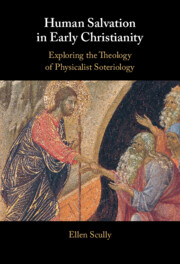Book contents
- Human Salvation in Early Christianity
- Reviews
- Human Salvation in Early Christianity
- Copyright page
- Contents
- Acknowledgments
- 1 The Rise and Fall of Early Christian Physicalist Soteriology
- 2 Scholarly Approaches to Physicalist Soteriology
- 3 Athanasius
- 4 Hilary of Poitiers
- 5 Marius Victorinus
- 6 Gregory of Nyssa
- 7 Cyril of Alexandria
- 8 Maximus the Confessor
- 9 The Almost, but Not Quite, Physicalists
- 10 Constructive Approaches to the Historical Reality of Physicalism
- Bibliography
- Index
7 - Cyril of Alexandria
Resurrection Physicalism
Published online by Cambridge University Press: 09 January 2025
- Human Salvation in Early Christianity
- Reviews
- Human Salvation in Early Christianity
- Copyright page
- Contents
- Acknowledgments
- 1 The Rise and Fall of Early Christian Physicalist Soteriology
- 2 Scholarly Approaches to Physicalist Soteriology
- 3 Athanasius
- 4 Hilary of Poitiers
- 5 Marius Victorinus
- 6 Gregory of Nyssa
- 7 Cyril of Alexandria
- 8 Maximus the Confessor
- 9 The Almost, but Not Quite, Physicalists
- 10 Constructive Approaches to the Historical Reality of Physicalism
- Bibliography
- Index
Summary
While the basic outline of the soteriological narrative of Cyril of Alexandria is a near repeat of Athanasius, Cyril reverses the role that Athanasius had given to physicalism in this narrative. While Athanasius had said that the physicalist (i.e., universal and automatic) transformation of human nature was related to humanity’s ability to receive the Holy Spirt and not connected to the salvation of humans from death, Cyril says the opposite: the physicalist transformation of human nature does not change humanity’s ability to receive the Holy Spirit (which is salvific), but it does save every human being from eternal death (which, in itself, is not salvific). Cyril demonstrates the limitations of physicalism within a theology that also includes the creationist ensoulment model: the physicalist effects of the incarnation are limited to the body. Cyril’s physicalism is part of his nuanced use of the Adam-Christ parallel in which Cyril carefully balances the agency of Adam and Christ.
- Type
- Chapter
- Information
- Human Salvation in Early ChristianityExploring the Theology of Physicalist Soteriology, pp. 204 - 236Publisher: Cambridge University PressPrint publication year: 2025

